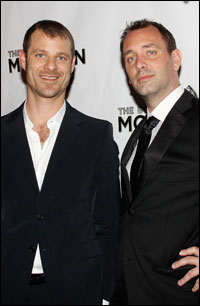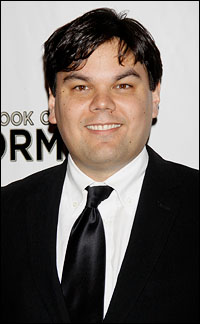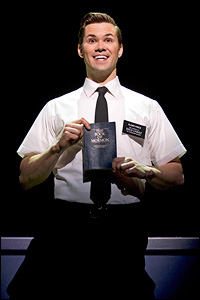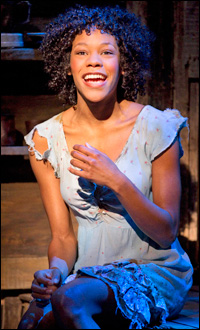
*
The Book of Mormon [Ghostlight]
"Hello, my name is Elder Butt-F***ing-Naked." Three months ago you might reasonably have thought it unlikely for a show with such a lyric to nab a Tony Award for Best Musical and/or Best Score. Time to readjust your thinking.
No, that line admittedly doesn't sound too musical, look too clever, nor seem particularly jolly. That's where context comes in: "Hello, my name is Elder Butt-F***ing-Naked" is one of the most explosively funny lines in one of the most explosively funny musicals in memory. (I've been going to musicals since I was a wee tad in 1959 and I would place The Book of Mormon first, ahead of the original production of How to Succeed in Business without Really Trying, the Phil Silvers revival of A Funny Thing Happened on the Way to the Forum, and The Producers.)
That quoted line, by the way, handily illustrates why Mormon — the show, not the religion — should take the Tony for Best Score. (It's safe to say that it will take Best Musical.) Sure, there are a few carpers likely to complain, "well, the songs aren't that good" or "the music doesn't compare to Gypsy or West Side Story." But we can just dismiss 'em; show me a surefire juggernaut, and I'll show you someone who inevitably finds reason to complain.
The award isn't for the best songs, or the best music or lyrics (or both); the award is for best score. "Score" meaning the 20 or so musical numbers that come across the footlights when nobody is talking; "best" describing how they contribute as a musico-dramatico element to the overall show. In the case of Mormon, the score provides perfect support. The show is so explosively funny (as above) because the book is explosively funny and the songs are explosively funny; so is the production, most especially the choreography and the costumes; and so are the performances. (Without going back to check, I'd estimate that at least 15 of the two dozen performers generate their own, specific, enormous laughs.)
| |
 |
|
| Matt Stone and Trey Parker | ||
| photo by Joseph Marzullo/WENN |
Does Mormon have the best songs of the season? That's not the question. Mormon is one of those musicals which, by design, can't afford to have "best" songs; that is, songs which stand out for musical quality. Songs like those contained in Carousel, say, or The Light in the Piazza. Mormon has a score similar to How to Succeed. It is said that Frank Loesser was pulled unenthusiastically into that project. Frank loved nothing more than writing big, gloriously musical songs, like those in Guys and Dolls and The Most Happy Fella. And he knew that Succeed called for a score of diabolically clever novelty songs, the sort which by definition don't allow the baritone to stand at the lip of the apron and sing loud. That said, the How to Succeed score works excellently — as we can hear any night by simply walking over to the Hirschfeld — and Frank got a Pulitzer for his efforts.
Should Broadway have a Best Song Tony? The Oscar folks have given such an award since 1934, of course, but that is neither here nor there. Back in the good old days that old timers so loudly and vociferously miss, Broadway had worthy potential Best Song contenders every season, sometimes by the handsful. But that stopped in 1969 or so. As a recent Tony nominator, let me say we would have been hard put to find four Best Song nominees over the course of my three seasons combined. Quick quiz: give me four Best Song nominees for 2009-2010. To make it easier, let me remind you of the nominees for Best Score: Memphis, The Addams Family, "Enron," and "Fences."
| |
 |
|
| Robert Lopez | ||
| photo by Joseph Marzullo/WENN |
But we're not talking about the Best Song, or songs; we are talking about the Best Score. And The Book of Mormon wins hands down. While the Scottsboro Boys score has some high spots, it did not carry the evening; and the Women on the Verge score, simply put, did not register in the theatre. There is also a fourth entrant this season, thanks to that four-nominees-or-bust rule that put items like Starmites in the Tony Award record book.
Let us consider one musical segment, a Ugandan-style retelling of the Mormon saga entitled "Joseph Smith American Moses." As a song? Not distinctive. As a staged musical number? Six minutes of pure hilarity, climaxing the show. I recently went back for a second visit — one where I could relax, without my critic's notebook in hand — and observed that this had perhaps the biggest and the most raucous audience response in an evening filled with raucous response. The Book of Mormon musically succeeds — and boy, does it succeed — not because of the songs, but because of the score. That's Trey Parker, Robert Lopez, and Matt Stone who wrote it. Yeah, they'll earn seven-figure fortunes for their efforts; nice, sure. But their work has also earned them the sincere admiration of the Broadway community.
| |
 |
|
| Andrew Rannells | ||
| photo by Joan Marcus |
A jumble, yes. However — and don't read this paragraph if you're sensitive to potential spoilers — the plot concerns teenaged missionaries sent to a brutal and lawless land to bring faith and hope to an impoverished natives. And while these teenaged missionaries don't follow the rules exactly, by the time the curtain falls they have — yes! — brought faith and hope to these impoverished natives. The Messrs. Parker, Lopez & Stone don't sanctify the Mormons, exactly; but their soldiers of the army of the Church of Jesus Christ of Latter Day Saints believe, and they are triumphant. Which kinda makes the sacrilegious Book of Mormon sweetly pro-Mormon.
There is no need to here commend performers; they've been so highly praised thus far, by critics and audiences, that they don't need to be told how good they are. Let's just say that it is encouraging to find four actors in the Tony Awards spotlight — Andrew Rannells, Josh Gad, Nikki M. James, and Rory O'Malley — who months ago were all-but-unknown along Broadway. We hear about star casting all the time, and how impossible it is for talented newcomers to get a decent break. The producers and authors and directors of The Book of Mormon gambled on newcomers, and I think they — the producers and authors and directors and the newcomers — will come out all right.
Let us also mention Michael Potts, who delivers the already-infamous "Hasa Diga Eebowai"; Brian Tyree Henry and Michael James Scott, who get to sing only a few laugh lines but do so convincingly; and the entire contingent of young Elders, who bring gleeful joy to the proceedings. Let us further salute Lewis Cleale, who is hidden away in several roles not even included in the cast list — Joseph Smith, Jesus — but who is of inestimable comic value to The Book of Mormon.
| |
 |
|
| Nikki M. James | ||
| photo by Joan Marcus |
All of this Mormon discussion leaves us with a fundamental question. Given the vast number of surprises, plot and otherwise, to be found on the CD — and considering the difficulty most theatregoers will have in scoring Mormon tickets in the near future — will listening to the CD in the meantime spoil the experience? Absolutely not, sez I. Why deprive yourself of the fun? And this score is plenty of fun, whether on stage or CD. If you have tickets next week, or maybe even next month, you might want to wait. Otherwise, go ahead and enjoy Mormon now. A good chunk of the humor is visual, from the many dozens of sight gags and the nifty choreography by Casey Nicholaw. Which is to say that even if you have listened to the score a dozen times, you're first viewing will be — there's that word again! — explosively funny.
The CD booklet merits a word or three. Nowadays, face it, many people just download their music. Easy, quick, and no trip to the CD store or whatever passes for a CD store nowadays. (The closest thing I have to a local CD store, which is to say one of those big bookstores with a large CD section, just went bankrupt and sold the fixtures.) Easy to buy digitally, yes; but the Book of Mormon CD comes with a first-class and altogether snazzy booklet. An essay by Frank Rich, who I must say is pretty good at this sort of thing; a detailed synopsis; and full lyrics, accompanied by dozens of delicious full-color photos. These from Joan Marcus, who has been giving us fine show photography for more than 20 years now.
What's more, the booklet has been especially well designed, with handy lyric quotes emblazoned on most of the photos. The liner notes are a joy to look at, really. The CD is a joy to listen to, too. And the show? Musical comedy rapture.
(Steven Suskin is author of the recently released updated and expanded Fourth Edition of "Show Tunes" as well as "The Sound of Broadway Music: A Book of Orchestrators and Orchestrations," "Second Act Trouble" and the "Opening Night on Broadway" books. He also pens Playbill.com's Book Shelf and DVD Shelf columns. He can be reached at [email protected].)
*
Visit PlaybillStore.com to view theatre-related recordings for sale.











